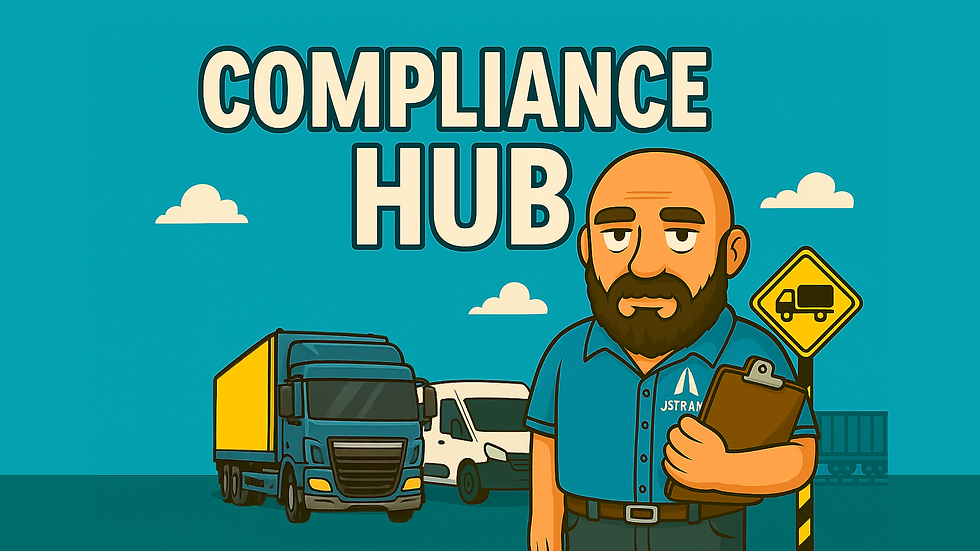

7. Transport Documentation & Record Keeping
Maintaining accurate and up-to-date transport documentation is not just a legal requirement—it’s a cornerstone of effective fleet management. For UK Restricted Operator Licence holders, failing to manage records properly can lead to penalties, investigations, or even licence revocation.
This section outlines what documents you need to retain, how long you must keep them, and best practices for maintaining a compliant and audit-ready record-keeping system.
Why It Matters
The Traffic Commissioner expects all operators—regardless of licence type—to maintain proper records. For restricted licence holders who may not employ a professional transport manager, understanding what’s required is critical for avoiding compliance breaches.
Good documentation helps to:
-
Prove your vehicles are roadworthy and well-maintained
-
Show that drivers are legally permitted and properly trained
-
Demonstrate control over your transport operations
-
Avoid unnecessary delays or issues during roadside stops or audits
Key Transport Records to Keep
Here’s a breakdown of the essential records every restricted operator should manage:
1. Vehicle Maintenance Records
-
Inspection sheets
-
Preventative maintenance schedules
-
Defect reports & rectification records
-
Invoices for parts and servicing
-
MOT certificates
🕒 Retention: Minimum of 15 months
2. Driver Records
-
Driving licences & CPC qualifications
-
Medical certificates (if required)
-
Driver training logs
-
Right to work checks
-
Induction and ongoing training records
🕒 Retention: While employed + 12 months
3. Tachograph & Working Time Records
-
Tachograph downloads (driver & vehicle)
-
Working Time Directive records
-
Infringement reports and remedial actions
🕒 Retention: Minimum of 2 years
⚠️ Even Restricted Licence holders using vehicles with digital tachographs must manage this data correctly if applicable.
4. Journey & Load Records
-
Delivery notes
-
Job sheets
-
Consignment paperwork
-
Proof of delivery (POD)
🕒 Retention: Minimum of 12 months (business need may dictate longer)
5. Operator Licence & Insurance Documents
-
Licence and disc copies
-
Correspondence with the Office of the Traffic Commissioner
-
Evidence of financial standing
-
Insurance schedules and certificates
🕒 Retention: For as long as they are valid, plus at least 12 months after renewal/change
Best Practices for Record Keeping
✅ Go Digital
Use fleet management software or secure cloud-based folders to organise documents by vehicle, driver, and date. Ensure regular backups and access controls.
✅ Set Up a Record-Keeping Schedule
Regularly audit your documents and dispose of outdated records responsibly. Use a checklist to track retention periods.
✅ Be Audit-Ready
Store documents in a way that allows quick retrieval. The DVSA or Traffic Commissioner may request certain documents at short notice.
✅ Train Staff
Anyone involved in document management—admin, drivers, or workshop staff—should understand what records must be kept and why.
Links to Related Blog Content
To support your compliance journey, explore our blog content that expands on documentation and record-keeping topics:
🔗 The Ultimate Vehicle Maintenance File Checklist for Operators
🔗 How Long Should You Keep Transport Records? A Quick Reference Guide
🔗 Digital vs Paper Records: What’s Best for Small Fleet Operators?
🔗 Driver Record-Keeping for Restricted Licence Holders: Avoiding Common Mistakes
🔗 Understanding Tachograph Responsibilities Under a Restricted Licence
🔗 Creating a Record-Keeping Policy for Your Transport Business
🔗 What to Do if the DVSA Requests Documentation
Downloadable Resources (Coming Soon)
Boost your compliance with these free downloads:
📥 Transport Record-Keeping Checklist
📥 Vehicle File Template
📥 Driver Document Audit Form
📥 Digital Folder Structure Guide (for Cloud Storage Systems)
Final Word
Proper documentation is your defence in the event of a roadside stop, audit, or public inquiry. For restricted licence holders—often juggling many responsibilities—clear, organised, and accessible records are a must. Use the tools and guidance provided here to build a system that keeps your business safe, efficient, and compliant.

